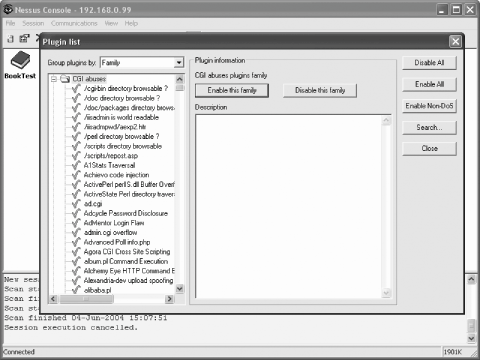A.4. Web Security ScannersSimilar to how network security scanners operate, web security scanners try to analyze publicly available web resources and draw conclusions from the responses. Web security scanners have a more difficult job to do. Traditional network security revolves around publicly known vulnerabilities in well-known applications providing services (it is rare to have custom applications on the TCP level). Though there are many off-the-shelf web applications in use, most web applications (or at least the interesting ones) are written for specific purposes, typically by in-house teams. A.4.1. NiktoNikto (http://www.cirt.net/code/nikto.shtml) is a free web security scanner. It is an open source tool available under the GPL license. There is no support for GUI operation, but the command-line options work on Unix and Windows systems. Nikto focuses on three web-related issues:
Nikto cannot be aware of vulnerabilities in custom applications, so you will have to look for them yourself. Looking at how it is built and what features it supports, Nikto is very interesting:
If Perl is your cup of tea you will find Nikto very useful. With some knowledge of libwhisker, and the internal workings of Nikto, you should be able to automate the boring parts of web security assessment by writing custom plug-ins. Nikto's greatest weakness is that it relies on the pre-built signature database to be effective. As is often the case with open source projects, this database does not seem to be frequently updated. A.4.2. NessusNessus (http://www.nessus.org) is a well-known open source (GPL) security scanner. Scanning web servers is only one part of what it does, but it does it well. It consists of two parts. The server part performs the testing. The client part is responsible for talking to the user. You can use the existing client applications, or you can automate scanning through the direct use of the communication protocol (documented in several documents available from the web site). Nessus relies heavily on its plug-in architecture. Plug-ins can be written in C, or in its custom NASL (short for Nessus Attack Scripting Language). A GUI-based client is available for Nessus (NessusWX, http://nessuswx.nessus.org), which makes it a bit easier to use. This client is shown in Figure A-8. Figure A-8. Nessus, the open source vulnerability scanner The problem with Nessus (from our web security point of view) is that it is designed as a generic security scanner, but the test categorization does not allow us to turn off the tests that are not web-related. |